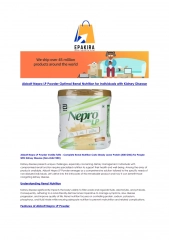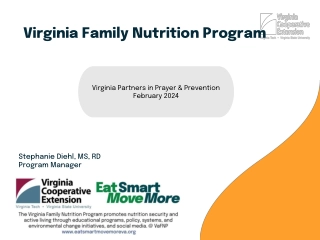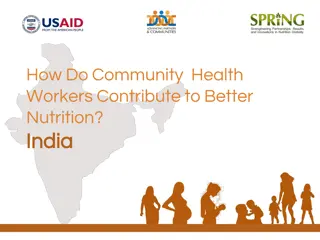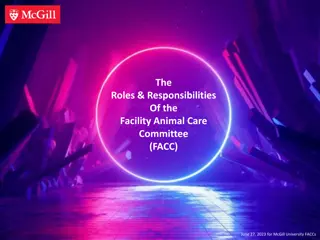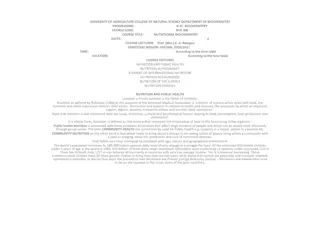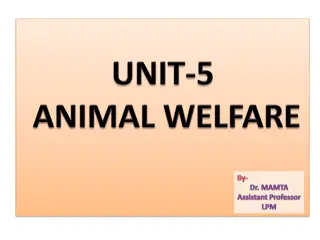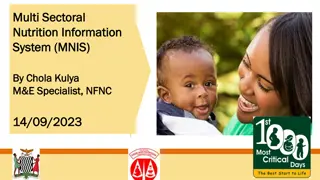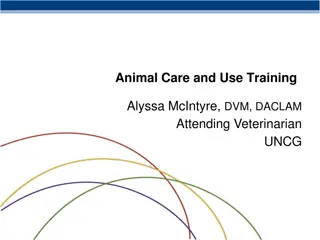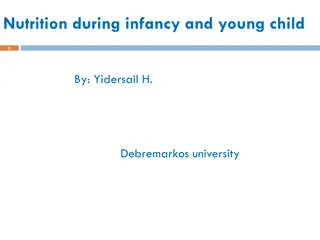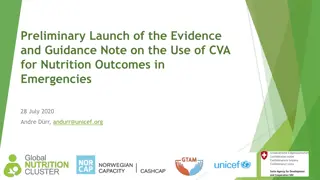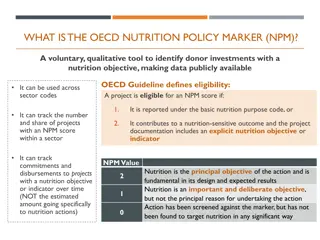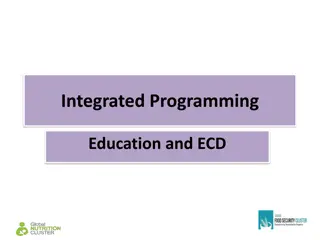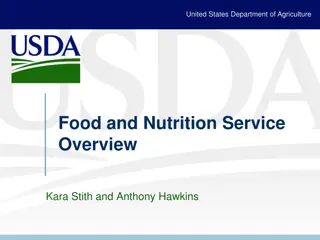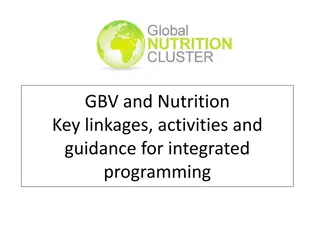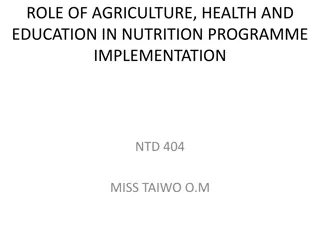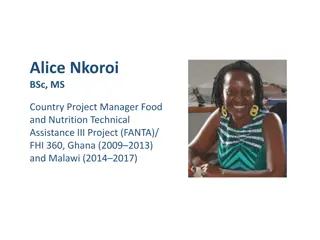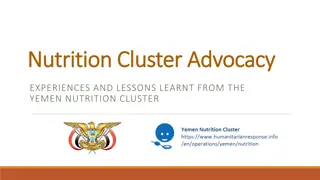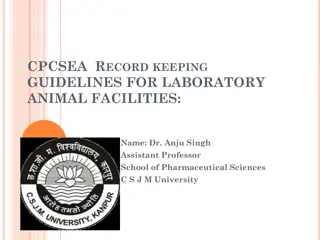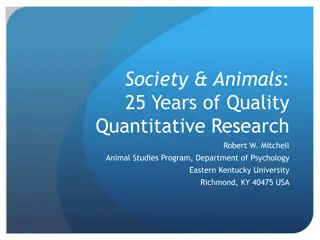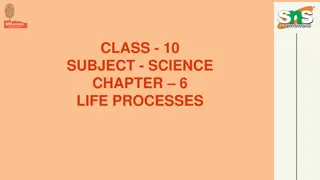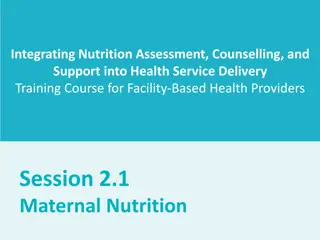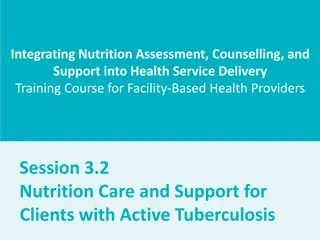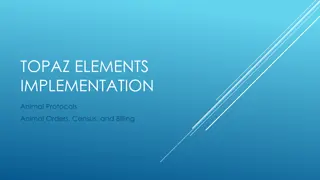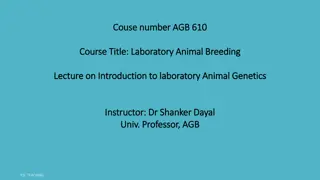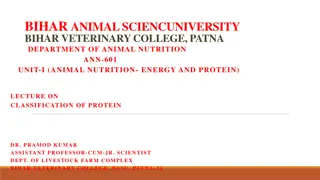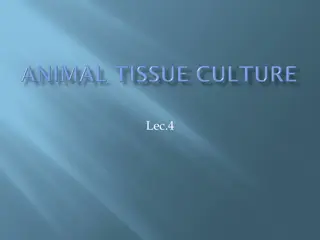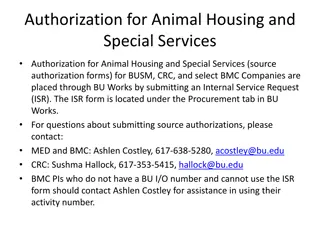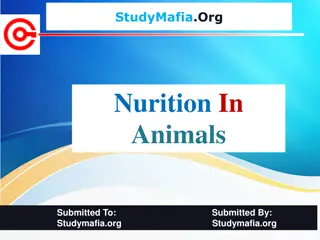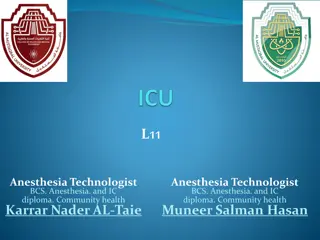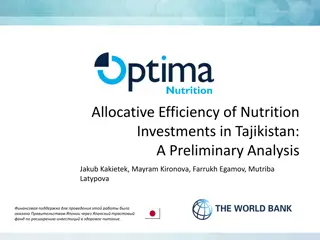Abbott Nepro LP Powder Optimal Renal Nutrition for Individuals
Abbott Nepro LP Powder Vanilla Toffe - Complete Renal Nutrition Carb Steady Lower Protein (400 GMS) For People With Kidney Disease (Non-DIALYZED)\n\nEssential Support: Abbott Nepro LP Powder For Renal Nutrition\n\nExperience Essential Support For Individuals With Kidney Disease Through Abbott Nepro
1 views • 4 slides
Virginia Family Nutrition Program
The Virginia Family Nutrition Program focuses on teaching limited-resource households how to make healthier food choices and manage available food resources for optimal health and growth. Programs cover basic nutrition, physical activity, safe food handling, and thrifty food shopping. Coordinated th
3 views • 18 slides
BSc Food Science & Human Nutrition Programme Overview
This BSc Food Science & Human Nutrition programme at Maynooth University offers a comprehensive understanding of nutrition, biology, and chemistry as applied to food. With a focus on ingredients, production, products, and nutrition, students explore various aspects of food science including food saf
3 views • 12 slides
Enhancing Multisectoral Nutrition Coordination in Zambia
The Multisectoral Nutrition Information System (MNIS) presented at a LeNNS meeting in Lusaka highlights the importance of a multisectoral approach to address nutrition challenges in Zambia. The coordination structures, evidence, and recommendations emphasize the need for collaborative efforts, adequ
1 views • 37 slides
Nutrition and Health Program Progress in Lao PDR
World Vision International is implementing a comprehensive nutrition and health program in multiple provinces of Lao PDR from 2020 to 2026. The program focuses on training healthcare staff, improving access to healthcare services, strengthening nutrition services, and promoting healthy practices for
2 views • 16 slides
Community Health Workers' Contribution to Improved Nutrition in India
Community Health Workers play a vital role in enhancing nutrition outcomes in India by delivering high-impact practices, policies, and services at the community level. They help strengthen the foundation of nutrition programs, support maternal and child health, and promote healthy behaviors. By iden
0 views • 27 slides
Responsibilities of Facility Animal Care Committee at McGill University
The Facility Animal Care Committee (FACC) at McGill University oversees animal activities, ensures ethical treatment of animals, and adheres to guidelines from organizations such as the Canadian Council on Animal Care (CCAC). Responsibilities include continual oversight of animals, approving care pr
1 views • 13 slides
Alina Michalska - Nutrition Specialist with UNICEF ESARO
Alina Michalska is a Nutrition Specialist with UNICEF Eastern and Southern Africa Regional Office (ESARO) based in Nairobi. She has a strong background in nutrition information systems and has worked on various projects to improve nutrition outcomes in different regions. With a Master's degree from
3 views • 22 slides
Native Nutrition and Energy Balance: A Comprehensive Guide for Grade 8
Explore essential nutrients, energy sources, energy uses, and health risks related to nutrition and physical activity in this comprehensive guide for Grade 8 students. Learn about the importance of a balanced diet, different food sources of nutrients, and the impact of nutrition on overall health an
5 views • 15 slides
Understanding Nutritional Biochemistry: A Comprehensive Overview of Nutrition and Public Health
Nutrition, as defined by Robinson, explores the relationship between food and the human body's functioning. This course delves into key topics such as nutrition in pregnancy, childhood, and the elderly, as well as nutrition-related diseases. It emphasizes the importance of public health nutrition in
1 views • 7 slides
Animal Welfare and Ethics: Standards and Regulations in India
The content covers a wide range of topics related to animal welfare, ethics, and laws in India. It delves into the definition of animal welfare, the role of veterinarians, animal welfare organizations, regulations like the Prevention of Cruelty to Animals Act, and protection of wildlife, working ani
0 views • 15 slides
Multi-Sectoral Nutrition Information System (MNIS) Overview and Implementation Details
The Multi-Sectoral Nutrition Information System (MNIS) is a web-based platform used by the National Food and Nutrition Commission (NFNC) in Zambia to collect essential data for monitoring and decision-making in the nutrition sector. MNIS facilitates the gathering of functional information to support
1 views • 10 slides
Importance of Training in Animal Care and Use for Research
Training in animal care and use is essential to ensure humane and appropriate treatment of research animals, promote regulatory compliance, and uphold high standards of science and animal well-being. The presentation covers the necessity of training, goals including reviewing animal use and identify
0 views • 53 slides
Infant Nutrition and Growth Development Overview
This informative content covers various aspects of infant nutrition and growth development, including breastfeeding, complementary feeding, and common nutritional problems. It also discusses assignments related to assessing nutritional status, harmful traditional practices, and the importance of neo
3 views • 61 slides
Understanding the Difference: Animal Rights vs. Animal Welfare
Explore the nuanced distinction between animal rights and animal welfare, delving into the ethical considerations, philosophies, and advocacy efforts surrounding these concepts. Discover how animal rights proponents emphasize the equal rights of animals, while animal welfare focuses on humane treatm
0 views • 36 slides
Exploring Cash and Voucher Assistance for Nutrition Outcomes in Emergencies
Launching a comprehensive Evidence and Guidance Note on the use of Cash and Voucher Assistance (CVA) for improving nutrition outcomes in emergency settings. The webinar agenda covers key terminology, evidence-based insights, recommendations for nutrition practitioners, and insights on the impact of
0 views • 33 slides
Understanding the OECD Nutrition Policy Marker (NPM)
The OECD Nutrition Policy Marker (NPM) is a voluntary tool to identify donor investments with a nutrition objective. It helps mainstream nutrition in large-scale programs to improve outcomes and accountability. The NPM is applied at the project level to track investments and promote transparency in
1 views • 4 slides
Integrated Programming in Education and ECD: Enhancing Nutrition for Child Development
Explore the vital role of nutrition in education and Early Childhood Development (ECD) through integrated programming. Discover how good nutrition impacts children's physical development, health, learning abilities, and cognitive potential, ultimately influencing their educational success. Delve int
0 views • 11 slides
Overview of United States Department of Agriculture Food and Nutrition Service
The United States Department of Agriculture Food and Nutrition Service (FNS) works to provide food and nutrition education to those in need while supporting American agriculture. Their mission is to end hunger and improve nutrition in America. The Contracts Management Division (CMD) focuses on custo
1 views • 15 slides
Nutrition Advocacy in Humanitarian Contexts: GNC Advocacy Insights
Explore the strategic framework of Nutrition Cluster Advocacy, focusing on influencing policies for improving nutrition in emergencies. Learn about the Global Nutrition Commitments and key initiatives driving action to address malnutrition. Discover the GNC Advocacy Toolkit designed to support Nutri
1 views • 22 slides
Integrating GBV and Nutrition: Key Linkages and Strategies
Gender-based violence (GBV) and nutrition are interconnected, with GBV being a key driver of malnutrition. Integrating GBV into nutrition programs can improve response quality, mitigate malnutrition risks, and reach vulnerable populations effectively. This integration enhances the safety, accessibil
1 views • 17 slides
Synergistic Role of Agriculture, Health, and Education in Nutrition Programs
Agriculture, health, and education play vital roles in nutrition program implementation. They are interconnected as agricultural practices impact health and nutrition outcomes. Agriculture is crucial for providing essential nutrition, while the health of individuals in agriculture affects productivi
2 views • 9 slides
Enhancing Pre-Service Nutrition Education for Nurses and Midwives in Ghana and Malawi
This project led by Alice Nkoroi focused on improving access and quality of nutrition services in Ghana and Malawi by enhancing pre-service nutrition education for frontline workers like nurses and midwives. The approach involved stakeholder consultation, defining core nutrition competencies, and co
1 views • 16 slides
Advocacy Strategy Development for Nutrition Cluster in Yemen
Amidst the challenges in Yemen, the Nutrition Cluster advocacy efforts focused on developing a comprehensive strategy to address nutritional needs of the affected population. The process involved partner identification, stakeholder engagement, strategy development, and implementation planning. The a
1 views • 9 slides
Laboratory Animal Facilities Record-keeping Guidelines
Guidelines for maintaining records in laboratory animal facilities include provisions for animal housing, staff records, health monitoring, and standard operating procedures. Compliance with CPCSEA regulations ensures ethical review procedures for animal research proposals. Focus is on providing a s
6 views • 11 slides
Exploring Human-Animal Interactions through 25 Years of Quality Research
Delve into the interdisciplinary realm of human-animal interactions with a focus on social sciences and quantitative research. Discover key themes such as social psychology, therapy, animal welfare, and more. Explore attitudes and personality differences related to animal treatment, empathy, and bel
1 views • 26 slides
Understanding Life Processes and Nutrition in Living Organisms
Life processes such as nutrition, respiration, transportation, and excretion are essential for living organisms to maintain life. This content delves into the various types of nutrition, including autotrophic and heterotrophic nutrition, with a focus on nutrition in plants, animals, and humans. It a
0 views • 20 slides
Maternal Nutrition Training: Integrating Assessment, Counselling, and Support
Maternal nutrition training session aims to educate health providers on the importance of maternal nutrition, causes and consequences of malnutrition, and strategies to break the malnutrition cycle. The training covers topics like defining maternal nutrition, understanding its significance throughou
0 views • 11 slides
Integrating Nutrition Assessment and Counselling for Clients with Active Tuberculosis
This training course emphasizes the critical relationship between nutrition and tuberculosis (TB), highlighting how undernutrition impacts TB infection and the implications of TB-HIV co-infections on nutritional status. Participants will learn about managing nutrition for individuals with active TB,
1 views • 29 slides
Improving Nutrition Goals for Children with CF
Optimizing growth and weight gain is crucial for children with cystic fibrosis (CF) to enhance health outcomes and survival. Behavioral barriers often hinder patients from achieving nutrition goals, but interventions combining nutrition and behavioral strategies have shown effectiveness. This approa
0 views • 27 slides
Sustainable Nutrition Multisectoral Commitments in Nigeria
Presentation at the 52nd Annual General Meeting of the Nutrition Society of Nigeria highlighting the importance of nurturing multisectoral commitments for sustainable nutrition in Nigeria. The Federal Government identified six priority areas of nutrition for investment in the National Multi-Sectoral
0 views • 9 slides
Importance of Calcium and Phosphorus in Animal Nutrition
Calcium and phosphorus are crucial minerals for animal health, with calcium being the most abundant mineral in the body. They play essential roles in nerve impulse transmission, muscle contraction, and bone structure. Deficiencies in these minerals can lead to conditions like rickets, osteomalacia,
0 views • 11 slides
Upgrading to TOPAZ Elements: Enhancing Animal Protocols, Orders, Census, and Billing
The Animal Resource Facility (ARF) and Office of Animal Care Compliance (OACC) are shifting to TOPAZ Elements, a comprehensive web-based system, to streamline management of animal protocols, orders, census, and billing. This upgrade aims to provide better oversight for PIs, enhance compliance with r
0 views • 8 slides
Understanding Laboratory Animal Genetics and Research Importance
This course (AGB 610) delves into the realm of laboratory animal breeding, exploring the significance of using animals in research and teaching. Dr Shanker Dayal, a distinguished professor, guides students through lectures on animal genetics and the common uses of laboratory animals. The course emph
0 views • 14 slides
Classification of Proteins in Animal Nutrition: Simple Proteins vs. Conjugated Proteins
Proteins in animal nutrition are classified into two main groups: simple proteins and conjugated proteins. Simple proteins can be further divided into fibrous and globular proteins based on their shape, solubility, and chemical composition. Fibrous proteins, such as collagens, elastin, and keratins,
0 views • 18 slides
Understanding Animal Tissue Culture and Cell Line Production
Animal tissue culture involves growing tissues separate from the animal in a laboratory setting. To achieve exponential cell growth, cells are converted into immortal cell lines. The production of a cell line involves steps like breaking cell adhesion, incubation, and transferring cells to fresh med
0 views • 22 slides
Authorization for Animal Housing and Special Services Process Guidelines
The guidelines outline the process for authorizing animal housing and special services at BUSM, CRC, and select BMC Companies through BU Works via Internal Service Requests (ISR). Investigators must submit ISR forms for animal housing at the Animal Science Center, monitor charges, and provide advanc
0 views • 8 slides
Understanding Nutrition in Animals: Types and Process
Nutrition in animals is vital for their survival, with various categories like herbivores, carnivores, and omnivores. Different modes of nutrition include filter feeding, deposit feeding, bulk feeding, fluid feeding, and suction feeding. The process of nutrition involves ingestion, digestion, absorp
0 views • 14 slides
Nutritional Therapy in the ICU: Enteral and Parenteral Nutrition Overview
Nutrition is crucial in ICU care to provide adequate calories and protein for patients. This involves enteral nutrition via tubes and parenteral nutrition through IV solutions. Enteral feeding should begin within 24-48 hours if the GI tract is functional, while parenteral nutrition includes dextrose
0 views • 13 slides
Optima Nutrition: Maximizing Efficiency of Nutrition Investments in Tajikistan
Preliminary analysis on the allocative efficiency of nutrition investments in Tajikistan reveals the potential impact of Optima Nutrition in optimizing resource allocation for various interventions. The tool aims to enhance the cost-effectiveness and effectiveness of public health investments in nut
0 views • 23 slides
